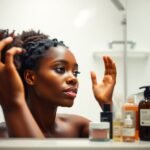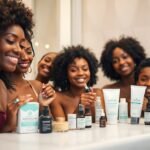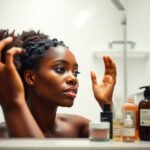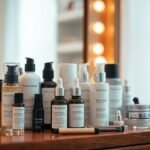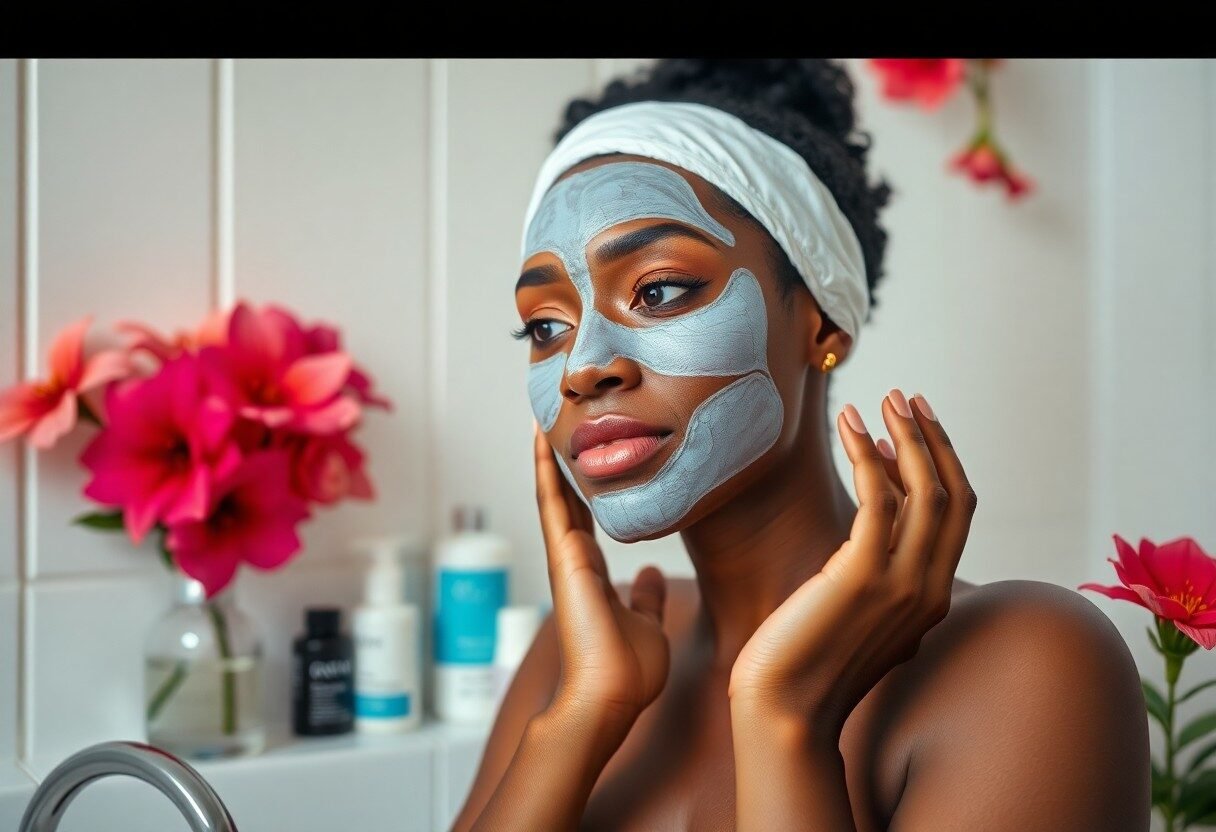
You may find yourself intrigued by the vibrant world of K-beauty and its innovative skincare products, but navigating this landscape can present unique challenges for you as a Black woman. Understanding skin type, ingredient compatibility, and how certain products affect melanin-rich skin is crucial for cultivating a radiant complexion. In this post, I’ll share my insights and tips on how to effectively choose K-beauty products that suit your unique needs while celebrating the diversity of beauty across all skin tones.
Key Takeaways:
- Understanding skin type and concerns is crucial to finding the right K-beauty products, particularly for Black skin, which may have unique needs.
- Ingredients play a vital role; opt for products that include hydrating and brightening components such as hyaluronic acid, niacinamide, and centella asiatica.
- Patch testing new products can help identify potential reactions, especially when trying formulations with high botanical content.
- Exfoliation is important, but approach it gently; K-beauty offers both chemical and physical exfoliants, so choose wisely depending on your skin’s sensitivity.
- Look for brands that prioritize inclusivity and cater specifically to darker skin tones, ensuring a wider range of shades and formulations.
- Layering products, a common K-beauty practice, can be effective; start with a lightweight essence and build to heavier creams or oils as needed.
- Stay informed by seeking out reviews from other Black women or influencers in the K-beauty community to guide your product choices.
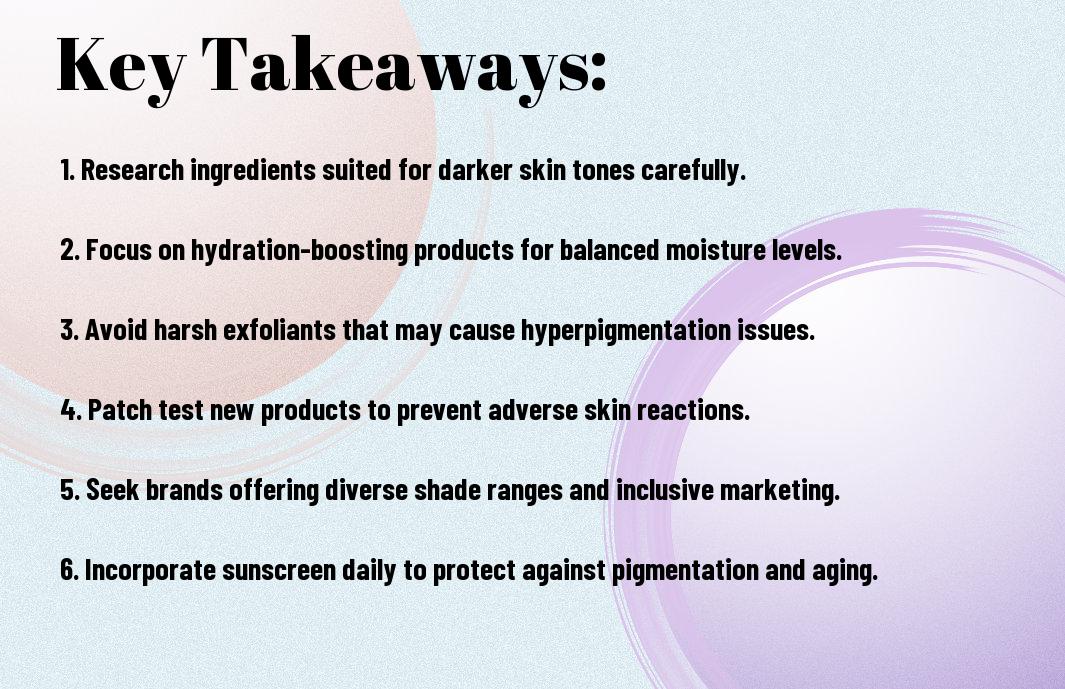
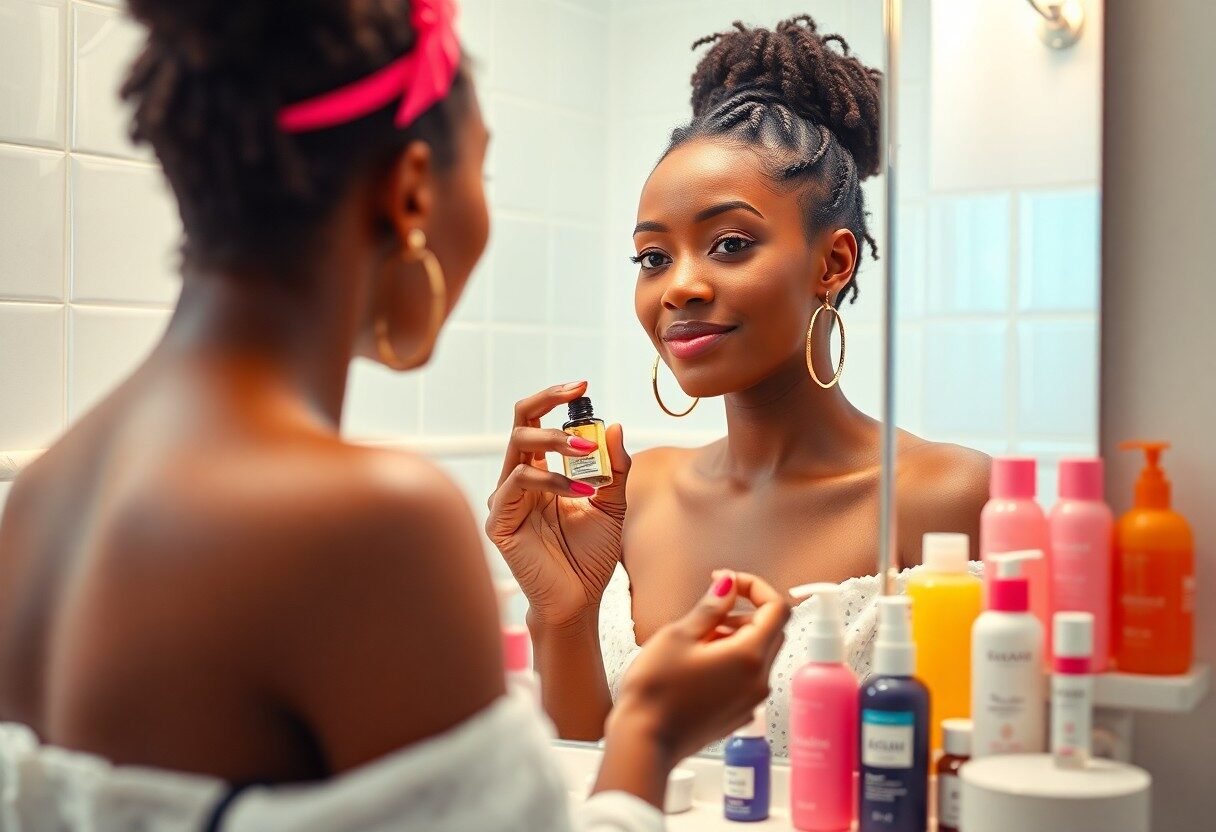
Bridging Cultures: The K-Beauty Framework and Black Skin
The K-beauty framework offers a unique blend of tradition and innovation that can be adapted for Black skin. It emphasizes hydration, gentle exfoliation, and thoughtful formulation—qualities that resonate with my own skincare journey. By understanding the core principles of K-beauty, I can better navigate product choices that cater to my specific needs as a Black woman, celebrating the beauty of my skin while exploring the art and science behind Korean skincare.
Key Differences in Skin Needs Across Various Ethnicities
Every ethnicity exhibits distinct skin characteristics and concerns. For Black skin, oiliness, hyperpigmentation, and sensitivity are often prevalent due to unique levels of melanin, which provides natural protection but can also lead to post-inflammatory hyperpigmentation. This differs significantly from typical needs in lighter skin tones, creating a necessity for tailored approaches to achieve optimal skin health.
How K-Beauty Addresses Diverse Skin Concerns
K-beauty incorporates a range of products specifically designed to tackle various skin concerns, including those prevalent in Black skin. For example, many K-beauty brands use ingredients like niacinamide and arbutin, known for their ability to brighten skin and reduce the appearance of dark spots, making them ideal for addressing hyperpigmentation. Additionally, the multi-step routine encourages proper hydration and gentle exfoliation, imperative for maintaining skin balance and elasticity.
The K-beauty approach directly correlates with many of the challenges I face, incorporating a variety of textures, from light essences to rich creams, all of which cater to different moisture levels and skin types. Products like balancing toners and serums containing hyaluronic acid and plant extracts help replenish moisture without clogging pores. Moreover, K-beauty often includes gentle exfoliants that effectively remove dead skin, promoting an even skin tone—imperative for minimizing the effects of scarring and uneven pigmentation that can occur in Black skin. As I explore these products, I discover textured-specific solutions that enhance my skincare routine while honoring my unique beauty.
Decoding Ingredients: What Works Best for Melanin-Rich Skin
A nuanced understanding of ingredients is necessary for harnessing the full potential of K-beauty products, especially for melanin-rich skin. Certain ingredients can brighten, hydrate, and even out skin tone, while others may pose risks. Tailoring your skincare routine to suit your unique complexion can make all the difference in achieving that coveted glow without adverse reactions.
The Role of Humectants, Emollients, and Occlusives
Humectants like hyaluronic acid draw moisture into the skin, ideally paired with emollients such as shea butter or jojoba oil to smooth and soften. Occlusives, such as petrolatum or beeswax, create a protective barrier to lock in hydration. For melanin-rich skin, this triad is vital, ensuring that you remain hydrated and protected against environmental stressors.
Specific Ingredients to Seek and Avoid for Black Skin
When dicking out products, look for ingredients like niacinamide and kojic acid, which help with hyperpigmentation and uneven skin tone. I avoid harsh exfoliants, like those in the AHA family, as they can cause irritation and exacerbate dryness. It’s also wise to steer clear of artificial fragrances that could trigger allergic reactions, leading to flare-ups or discomfort.
Niacinamide not only targets dark spots but also strengthens the skin barrier, pivotal for melanin-rich individuals often grappling with dryness and sensitivity. Kojic acid is another powerhouse that can address hyperpigmentation effectively without causing excessive irritation. On the other hand, exfoliants such as glycolic acid may seem appealing but they can strip too much moisture away, highlighting the importance of balance. Opting for gentle exfoliants or those combined with soothing ingredients can help in maintaining the skin’s integrity while still promoting a radiant complexion. Lastly, always checking labels for potential irritants is vital; your skin deserves the best care tailored to its needs.
Curating Your Skincare Routine: A Step-by-Step Guide
| Step | Description |
|---|---|
| 1. Cleanser | Start with a gentle, hydrating cleanser to remove dirt and makeup without stripping moisture. |
| 2. Toner | Use a toner with hydrating properties to prep your skin for the following products. |
| 3. Essence | Apply an essence filled with vitamins and antioxidants to nourish and brighten your complexion. |
| 4. Serums | Incorporate specific serums targeting your unique concerns such as hyperpigmentation or hydration. |
| 5. Moisturizer | Choose a moisturizer that seals in hydration and offers a protective barrier against environmental stressors. |
| 6. Sunscreen | Finish with a broad-spectrum sunscreen to protect your skin from UV damage. |
Essential K-Beauty Products for Every Skin Type
Different skin types require specific products to look and feel their best. For oily skin, lightweight gel moisturizers and salicylic acid serums effectively control excess oil and prevent breakouts. Dry skin thrives with rich creams and hyaluronic acid-infused essences, which provide important hydration. Combination skin benefits from balancing toners and moisturizers that address the needs of both oily and dry areas. Sensitive skin should opt for calming ingredients like centella asiatica and chamomile to soothe irritation.
Crafting a Personalized Regimen for Optimal Hydration and Glow
To achieve optimal hydration and a radiant glow, tailor your regimen to your skin’s specific needs. Incorporate a weekly hydrating mask that features ingredients like aloe vera or honey to lock in moisture. Adjust the number of products based on your daily routine—if you’re short on time, prioritize a lightweight moisturizer and a broad-spectrum sunscreen for protection. Additionally, don’t shy away from mixing textures; layering a watery essence under a thicker cream can yield fantastic results. Tailor your routine to suit your lifestyle, ensuring that each step brings you closer to your skin goals.
Unpacking Misconceptions: Myths About K-Beauty and Dark Skin
Many misconceptions surround the relationship between K-beauty products and dark skin. One dominant myth suggests that these products are solely designed for lighter skin tones, which often leads to feelings of exclusion within the beauty community. This misunderstanding not only limits access to effective skincare solutions but also perpetuates a narrative that K-beauty is not equipped to address the needs of melanin-rich skin. Tackling these myths is vital to enriching my skincare journey and ensuring that all women can find products that truly work for them.
Debunking Stereotypes in Beauty Marketing
Beauty marketing often leans into stereotypes that undermine the effectiveness of K-beauty for dark skin. Here are some common misrepresentations:
- Light-skinned models dominating campaigns.
- Misleading claims about product effectiveness for melanin-rich skin.
- Lack of shade diversity in color cosmetics.
- Generalizations that ignore unique skin concerns.
- Failure to include Black women in product testing.
Any misinformation only serves to alienate consumers and reinforce false narratives about beauty standards and skincare efficacy.
| Myth | Truth |
| K-beauty caters only to light skin | K-beauty offers products that are beneficial for all skin tones. |
| All K-beauty products are too harsh | Many K-beauty products feature gentle, nourishing ingredients. |
| Effective skincare is only for the affluent | Affordable K-beauty options exist that deliver great results. |
| Exclusively uses western beauty standards | K-beauty embraces diverse beauty in its marketing and product formulations. |
| Melanin-rich skin doesn’t need hydration | Hydration is vital for maintaining healthy skin at any tone. |
The Impact of Social Media on Product Perception and Availability
Social media has transformed how K-beauty products are perceived and accessed, particularly for Black women. Platforms like Instagram and TikTok create awareness, showcasing real-life testimonials from influencers who represent diverse skin tones and types. Brands now actively engage with consumers on these platforms, allowing for straightforward communication about product suitability and ingredients. This engagement fosters a sense of community and leads to a wider demand for products specifically formulated for melanin-rich skin. As representation increases, I see more tailored solutions that address my skincare needs.
The democratization of beauty knowledge through social media has been pivotal. For example, when I discovered a K-beauty line through an influencer’s review, I felt more confident trying it out based on her experience. Authentic storytelling and personal recommendations from women who share similar experiences can make all the difference in finding the right products. Engagement with a larger online community provides a platform for discussions about our unique skincare needs, helping us collectively challenge and reshape beauty norms.
Thriving in the K-Beauty Market: Where to Shop and What to Trust
Navigating Online and Offline Retail Options
Exploring both online and offline retail options opens up a world of K-Beauty products. Popular online platforms like YesStyle and Amazon offer a vast assortment, often with user reviews detailing product experiences from diverse skin types. Local Asian markets or K-Beauty specialty stores can provide valuable opportunities to test products firsthand. Additionally, checking out social media pages or beauticians who specialize in K-Beauty can lead you to hidden gems and curated collections tailored for melanin-rich skin.
Recommended Brands and Products Celebrating Inclusivity
Some K-Beauty brands are beginning to prioritize inclusivity, expanding their shade ranges and formulations. Fenty Beauty, while not a traditional K-Beauty brand, has collaborated with K-Beauty companies to create products suitable for all skin tones. Innisfree and Etude House also offer serums and moisturizers that cater to more diverse skin types. They’re working towards formulations that embrace variations in melanin levels, showing their commitment to all beauties.
Brands like Klairs and The Face Shop have developed products known for their sensitive-skin-friendly components, which complement melanin-rich skin beautifully. I’ve personally had great success with Klairs’ Rich Moist Soothing Cream, which provides deep hydration without irritation. Laneige’s Water Sleeping Mask is also a favorite for achieving that dewy, plump appearance. Pay attention to brands that actively promote diversity in their marketing campaigns and product lines, as they’re often more attuned to the specific needs of your skin type.
Final Words
On the whole, embracing K-Beauty skincare products as a Black woman has been a transformative journey for me. I encourage you to explore the diverse offerings, as many formulations cater to various skin types and concerns. It’s important to prioritize products that resonate with your unique skin needs, while also understanding the ingredients that work best for you. With patience and experimentation, you will discover the best K-Beauty routines that enhance your natural beauty and embrace your individual skin story.
FAQ
Q: What is K-Beauty, and how is it different from Western skincare?
A: K-Beauty, or Korean Beauty, refers to skincare and cosmetic products originating from South Korea. It emphasizes a multi-step routine and focuses on hydration, nourishment, and achieving a “glass skin” look. Unlike many Western products that may use heavier formulations, K-Beauty products often contain lighter textures and unique ingredients such as snail mucin and centella asiatica that prioritize skin health.
Q: Are K-Beauty products suitable for Black women’s skin types?
A: Yes, many K-Beauty products can benefit Black women’s skin types. However, it’s imperative to choose products that cater to specific skin concerns, such as hyperpigmentation, dryness, or sensitivity. Look for formulas that contain moisturizing ingredients like hyaluronic acid and centella asiatica, and avoid products with harsh alcohols or irritants.
Q: How can I identify the right K-Beauty products for my skin tone?
A: To identify suitable K-Beauty products, consider your skin type (oily, dry, combination, sensitive) and specific concerns (acne, hyperpigmentation). Research products featuring natural ingredients known to improve skin tone and texture. Additionally, seek out reviews and recommendations from other Black women who have tried the products to get an idea of their effectiveness and suitability for darker skin tones.
Q: What are some popular K-Beauty ingredients that work well for Black skin?
A: Some popular K-Beauty ingredients include niacinamide (for brightening), alpha-arbutin (for reducing hyperpigmentation), and fermented ingredients (for improving skin texture). Other beneficial ingredients include centella asiatica, tea tree oil, and various antioxidants, which can help soothe inflammation and promote an even skin tone.
Q: How do I start a K-Beauty skincare routine as a beginner?
A: Start with a basic routine that includes a cleanser, toner, moisturizer, and sunscreen. Gradually introduce additional products like essences, serums, or sheet masks based on your skin’s needs. It’s advisable to patch-test new products and introduce them one at a time to avoid overwhelming your skin.
Q: Can K-Beauty help with hyperpigmentation common among Black women?
A: Yes, many K-Beauty products are formulated to specifically target hyperpigmentation. Look for products containing niacinamide, vitamin C, or any brightening serums. Consistency is vital; using these products regularly, along with sunscreen, can show noticeable results over time.
Q: Are K-Beauty products generally affordable, and where can I find them?
A: K-Beauty products are often competitively priced, ranging from budget-friendly to high-end options. You can find them at various retailers, including online shops specializing in K-Beauty, beauty supply stores, or major retailers with international beauty selections. Be on the lookout for sales and bundles to make the most out of your budget!

